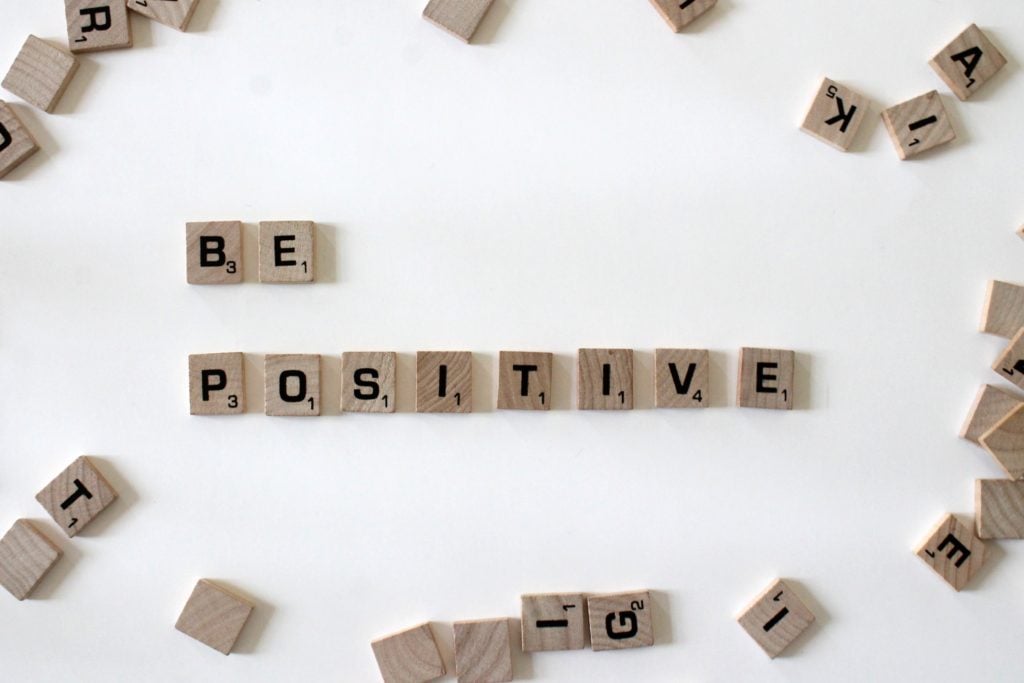
Some people think a positive mindset is just being ignorantly, ridiculously upbeat all the time. If this was what it was all about, I definitely wouldn't be writing about it, and I would hope that you wouldn't want to have anything to do with it.
But having a positive mindset isn't just about pretending life is 100% amazing. It's actually about accepting the good and the bad, seeing things as they really are, and finding some positive morsels in there anyway.
Positive Psychology
Positive psychology is a branch of psychology that aims to understand happiness in everyday life. Some people are happier than others. There's no question. And positive psychology comes from the desire to understand why that is, so more people can be happier more often.
You could trace positive psychology all the way back to ancient Greece, where philosophers like Plato and Socrates grappled with what it meant to live a fulfilling life. In slightly more recent times, William James put out the call in 1908 for his fellow psychologists to figure out why some people led happier lives than others.
Think of it as focusing on the positive. Instead of analyzing why people are sad, angry, or unfulfilled, positive psychology is about analyzing and exploring why people are fulfilled and happy.
Positive psychology became an official area of study in 1998 when Martin Seligman made the case for moving past the disease model of psychology. It's a growing field that focuses on what works instead of what doesn't.
Mindset
Carol Dweck is famous for her mindset theory. The idea is that there are two mindsets: fixed and growth. You have a fixed mindset when you think that skills and abilities are fixed from birth. You're either smart or dumb, fast or slow, skilled or not. On the other hand, a growth mindset is when you think of skills and abilities as malleable. People get better at things when they practice.
This mindset idea, when combined with positive psychology, gives us an idea of what a positive mindset is. Positive is when you focus on what works. It's a kind of realistic optimism. And mindset is how we think about things. A positive mindset is aligned with Dweck's growth mindset. When we can look at what makes us happy and fulfilled and then strive to expand this, we're operating from a positive mindset.
Improvisation
My main research interest is improvisation. Improvisational theatre is when performers create a theatrical performance from scratch, without a script.
But there are rules to improvisation that make it easier for improvisers to collaborate with each other. One rule is the rule of agreement or "Yes And." This rule says that improvisers have to agree with the reality their partner is establishing and then add onto that reality.
Let's say your scene partner says, "Mom, I did my homework."
If you're following the Yes And rule, you need to agree with the reality that you are Mom and that your son or daughter did their homework. Then you have to add a new detail onto this reality. You might say that now they have time to help you make dinner or how you hope that's enough to bring their science grade up.
Another improv rule is to treat your fellow improvisers like geniuses, poets, and artists and to reserve judgment. If you are thinking about how Sally always comes up with lame ideas and you hate improvising with her, you're for sure going to miss out on details in the scene. Your negativity is going to stop you from performing to your highest potential.
That's the kind of positivity that a positive mindset requires. And improv gives us a shortcut to bring this positivity into our everyday lives.
Play Your Way Sane

After writing the academic book Theatrical Improvisation, Consciousness, and Cognition, I realized that I had begun to crack the code about why improv makes people more focused, present, and at ease onstage. But I felt like a giant hypocrite because I was still walking around totally unfocused, in my head, and anxious as ever. I knew what an improv mind was, but I didn't know how to transfer these benefits to everyday life.
That's why I developed Play Your Way Sane. I divided the benefits of improv into twelve lessons:
- Setting the Stage
- Calm the Hell Down
- Finding the Game
- Getting and Staying Positive
- Thou Shalt Not be Judgy
- World of Geniuses
- You Aren't Special
- Shut Up and Listen
- Yaaas!
- And What?
- Embracing Mistakes
- Making Big Choices
Then, I developed improv-inspired exercises for each of the twelve lessons. These are games you can play every day that will help you develop the skills to start experiencing improv mind on a regular basis.
Getting and Staying Positive
Getting and Staying Positive is the fourth Play your Way Sane lesson. It's all about accepting the good and bad in life but opening yourself up to the good. There's not always a silver lining, but priming yourself for the positive will help you find it when it is there.
To start developing your positive mindset here are six positive thinking exercises:
1. Affirmation Station

This exercise is about searching for the positive things about yourself, making it a ritual so you can prime yourself for the positive.
Just look in the mirror and start saying all the good things about yourself and your life that you can think of.
Love your house? Say it.
Pleased with your new haircut? Announce it.
Happy to have your health? Tell somebody.
Affirmation Station is a ritual that can help you start your day with a more positive mindset.
2. The Good Book

The Good Book is getting your Affirmation Station thoughts on paper. It's like a gratitude journal. Write about all the good things you've got going. This isn't to make you forget all the bad things, but sometimes we need to remind ourselves of the good.
3. Did Anybody Die?

Perspective is important. In order to keep my negative thoughts in check, I sometimes ask myself if anybody died.
If the answer is yes, then I'm legitimately sad. Again, a positive mindset isn't about pretending to be happy. It's about accepting things as they really are and then working to find the good. Sometimes there isn't any good. Or we don't see it because we're grieving. That's totally fine. It's where we are.
But most of the time, no one died. Most of the time, there is a silver lining.
I'm not asking that you move in with the silver lining, but I am asking you to flirt with it from time to time.
4. High-Fives for Everyone

This exercise seems wonderfully quaint and antiquated now. I am writing this in the midst of the global COVID-19 pandemic, so telling everyone to high-five like mad is definitely farfetched.
However, if there comes a time when we can reconnect with high-fives, I hope they come back. They're a great way to look people in the eyes, get silly, and proclaim, "Yeah!!!!"
High-Fives for Everyone is a game where you try to collect as many high-fives as you can. If high-fives aren't an option, for whatever reason, there are other ways to form these positive connections. Write people "high-five letters" where you tell them how they rock. Or give people virtual high-fives because they rock.
It will help you develop your positive mindset because you are priming yourself to see the good in others.
I know every time my daughter needs it, I give her a high-five. It's the quickest way for me to express my positive feelings about something she's done or my general positive feelings.
5. The Spin Room

The Spin Room is an everyday game that asks you to put a positive spin on things. This optimism takes some practice.
Your house is a mess? Think about all the time you spent with your family instead of cleaning. Positive!
You can't find a job? At least you don't have to deal with a demanding boss?
Once again, I'm not asking you to be blindly, ignorantly positive. Not having a job can be bad news. Accept your feelings and the current reality, but that doesn't mean you can't also look for the silver lining.
6. On The Other Hand

On the Other Hand is something you can say to add something positive when you catch yourself being negative.
The next time something negative slips from your mouth, just add "on the other hand" and then add something positive.
You can also use "however" or "but" or whatever word or phrase helps you transition from bad to good.
The Positivity Challenge

That brings us to the Positivity Challenge. First of all, I love a good challenge. I developed the Say Yes to Everything Challenge, the Mindfulness Challenge, and the Small Talk Challenge. Challenges make things more fun. It's like a double-dog dare that you just have to do...because it's a challenge.
To complete the Positivity Challenge, you need to keep track of all the negative things you say for an entire week. Then, when you catch yourself being negative, try to say something positive.
The thing I love about this challenge is that it makes you aware of how much you are negative. I thought I was a relatively upbeat person until I tried the challenge. Turns out, not so much.
But there's good news: think back to that growth mindset. If we are negative this week, it doesn't mean we're a negative person. It's not an inborn trait, and we can change it if we dedicate the time to practice positivity.
The Cognitive Reframing Challenge

Speaking of challenges, I also came up with the Cognitive Reframing Challenge to help people catch their unhealthy thoughts and try to reframe them to be more in line with reality.
Cognitive distortions are ways our brains trick us into distorting reality. For example, if our boss looks angry, we might trick ourselves into thinking she's mad at us or that we are going to get fired.
Our brain has taken some big liberties with reality and tricked us into negativity. To counteract this, keep track of all your cognitive distortions for a week. Then figure out which one you do most. Mine was catastrophizing. That's when your brain leaps to end of days scenarios at the slightest sign of trouble.
After you find out which distortion is your go-to cognitive distortion, reframe it. Ask yourself if it's true or not, how often it's true, and what's a more logical reality. Then you can develop a mantra to say every time you slip back into that cognitive distortion. For me, I might tell myself, "You don't know that" every time I imagine myself penniless and alone when someone rolls their eyes at me because, let's be honest, I really don't know what the future holds. And I shouldn't let my brain trick me like that.
Final Thoughts on a Positive Mindset
A positive mindset is not about pretending life is amazing all the time no matter what. But it is about getting in touch with how our brain works, how often it's negative, and whether or not that matches with reality. Then, we can work to shift that negativity, to be less negative, and to start seeing the silver lining when it does exist.
I don't know of anyone who wants to be ignorantly happy. Instead, a positive mindset offers us a goal for how we want our brains to perceive our present situation. We can complain, gossip, and make excuses or we can be grateful for what's working in our lives in order to expand on those good things.
Life isn't positive or negative. It's chockfull of both. And we can't control many aspects of what life throws at us. But we can control our perception. Developing your positive mindset is about catching yourself when you get negative, asking if that's valid or not, and then making a new, more positive choice when it makes sense to do so.
Hopefully this will allow you to have a more positive mindset regardless of your current reality.
